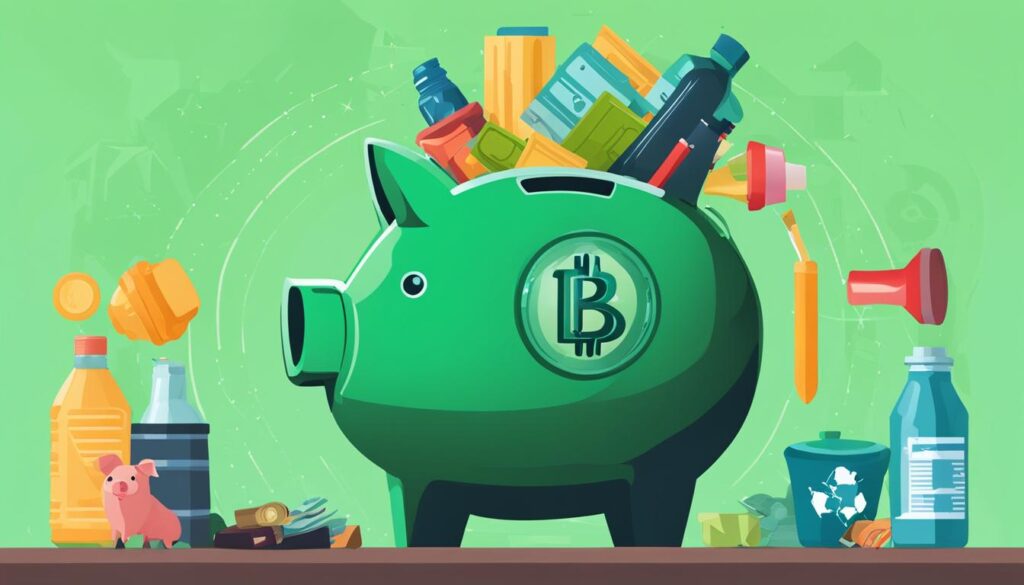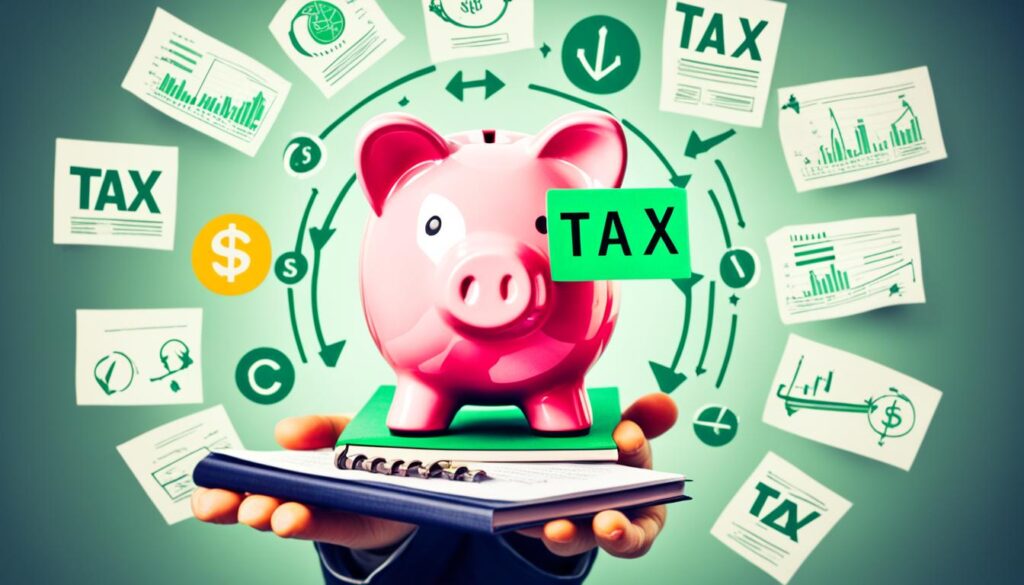Living on a budget doesn’t mean giving up what you love. You don’t have to live with less if your budget is tight. We’ll share 20 ways to save money without giving up the good life. These tips will help you make a budget that focuses on what you need, build a fund for emergencies, find smart ways to deal with debt, use tax breaks, eat more meals at home, cut grocery costs, find big discounts, sell things you don’t use, buy used items instead of new, save on insurance, think about personal loans, lower utility bills, enjoy the public library, find free fun, use work benefits, get a side job or other chances, work for tips, find a roommate, think about moving to a smaller place, and get help when you need it.
Key Takeaways
- Create a budget that focuses on your needs for smart spending.
- Start an emergency fund to protect your financial future.
- Find smart ways to handle your debt, like debt consolidation or personal loans.
- Use tax breaks, including the earned income tax credit, to reduce what you owe in taxes.
- Saving money by eating at home lets you enjoy dining out sometimes without spending too much.

Create a Budget That Prioritizes Needs
Creating a budget is the first step to smart money management. It helps ensure you use your money wisely. This means putting your needs first in your budget plans.
List down expenses like food, housing, clothes, and bills. These are your must-haves. After paying for them, see what’s left for other things and saving.
When money is tight, you might have to skip some wants. It’s hard but necessary. Remember, it’s about using what you have wisely.
Sticking to a budget needs discipline. Yet, it pays off in the long run. It helps you not spend too much and saves money for the future.
Remember, budgeting isn’t about cutting fun. It’s about making smart money choices. This way, you spend on what really matters and save too.
“A budget is telling your money where to go instead of wondering where it went.” – Dave Ramsey
A budget that focuses on needs is key to managing money well. It’s how you make the most of your income and reach financial stability.
Example Budget
Here’s an example budget focusing on needs:
| Expense | Monthly Amount |
|---|---|
| Housing (Rent/Mortgage) | $1,200 |
| Utilities (Electricity, Water, Internet, etc.) | $200 |
| Transportation (Car Payment, Insurance, Fuel) | $300 |
| Groceries | $300 |
| Clothing | $100 |
| Healthcare | $150 |
| Debt Payments | $300 |
| Savings | $200 or more |
| Entertainment/Leisure | Varying, based on available funds |
This is just a starting point. Adjust it based on your money and goals.
By focusing on needs, you set a strong base for good money management. Control your spending, choose wisely, and meet your financial goals.
Build an Emergency Fund
Building an emergency fund is key for financial security. Even with a tight budget, saving money each month is crucial for unexpected costs. This fund is your safety net for financial surprises.
Start by saving a bit of your income each month. Then, increase it over time. It may seem hard at first, but every bit helps. You’ll be surprised how much you can save.
An emergency fund brings financial peace. Life is full of surprises. For any unexpected bills or repairs, this fund helps you avoid debt.
Setting aside money for the unexpected means less stress on your budget. Instead of using a credit card or loan, you can use this fund for emergencies.
Building this fund needs time and discipline. Set goals and stick to a saving plan. It’s about saving regularly, not just the amount at first.
The Benefits of an Emergency Fund:
- Financial Security: An emergency fund provides a safety net during unexpected situations, giving you peace of mind knowing you’re prepared.
- Freedom from Debt: By having savings readily available, you can avoid relying on credit cards or loans when faced with unexpected expenses.
- Reduced Stress: Knowing that you have a financial cushion can alleviate the stress that comes from uncertainty and unexpected financial challenges.
- Flexibility and Independence: An emergency fund gives you the freedom to make financial decisions without being bound by immediate cash flow needs.
Whether starting or boosting your emergency fund, begin today. It’s a vital step towards financial security. Your future self will be grateful.

Tackle Your Debt in Smart Ways
If you’re battling debt, it’s key to act fast to regain financial control. Just paying the minimum on debts might not cut it. Look into smart options like managing debts, paying them off, consolidating, or using a personal loan to streamline your debt strategy.
Debt Management
Managing your debt starts with a good look at what you owe. Organize your credit card, student loan, and personal loan debts. Then, make a budget that focuses on paying off debts, especially those with high interest rates. This way, you pay less in interest and get debt-free faster.
Debt Repayment
For debt repayment, consider the debt snowball or avalanche methods. The snowball method has you clear the smallest debt first. You keep going, using the funds from cleared debts to tackle larger ones. It feels great to knock out those small debts and build up to the bigger ones.
The avalanche method, however, focuses on debts with the highest interest rates. Tackling these debts first saves you money in the long run. Pick the method that best matches your financial goals and keeps you motivated.
Debt Consolidation
Debt consolidation combines your debts into one loan with potentially lower interest. It’s great for high-interest credit card debts. A single loan means easier repayments and often lower monthly costs. Always check the consolidation loan’s terms to ensure it fits your financial plans.
Utilizing a Personal Loan
Using a personal loan for debt management is another tactic. It offers a lump sum to clear several debts at once. Since personal loans usually have lower interest rates than credit cards, they’re a good choice for consolidating debts. Make sure the loan’s terms and monthly payments fit your budget.
Taking smart steps to manage your debt leads to better financial control and a debt-free life. Whether it’s managing debt, repaying it, consolidating, or getting a personal loan, each method helps improve your financial health and brightens your financial future.

Take Advantage of Tax Breaks
If you’re earning a low wage, you can better your finances by using tax breaks. The earned income tax credit (EITC) is one such break. It’s made to help people and families who earn below a certain amount. You can use the EITC to lower your taxes or get a refund.
What is the earned income tax credit?
The EITC is a key tool for those with lower incomes. Being a refundable tax credit, it can lead to a refund if it’s more than what you owe in taxes. The EITC mostly helps those with modest earnings.
How can the EITC benefit you?
The EITC can cut down your taxes or perhaps give you a refund. That extra cash can help pay debts, save for emergencies, or fund other needs. By smartly using this refund, you can enhance your financial health and chase your goals.
“By utilizing tax breaks, you can keep more money in your pocket and improve your financial situation.”
How do you qualify for the earned income tax credit?
Qualifying for the EITC depends on how much you make and your tax status. Check the IRS’s rules or speak to a tax expert to see if you qualify. It’s crucial to use all tax breaks you can to save the most money.
Using your tax refund wisely
It’s important to use your tax refund wisely to best aid your finances. Think about using it to clear high-interest debts, save for sudden bills, or handle vital expenses. Smartly allocating your refund can boost your finances and set you up for success.
Tax Breaks Comparison
| Tax Break | Description | Eligibility | Benefit |
|---|---|---|---|
| Earned Income Tax Credit (EITC) | A refundable tax credit for low to moderate-income individuals and families | Based on income and filing status | Reduces tax liability or results in a tax refund |
| Tax Credits for Education Expenses | Credits for qualified education expenses incurred by the taxpayer or their dependents | Based on education expenses and income level | Reduces tax liability |
| Deductions for Homeowners | Deductions for mortgage interest, property taxes, and other expenses related to homeownership | Requires homeownership and specific expenses | Reduces taxable income |

To better your finances, fully use tax breaks like the EITC. Talk to a tax pro or use online help to make sure you’re getting all credits and deductions. Planned well, you can enhance your tax refund and achieve your financial dreams.
Eat at Home
Cooking at home is an easy way to spend less. Dining out often can be expensive. By making meals at home, you control your meal planning and save easily on food costs.
Meal planning saves you time and money. Start by picking your meals for the week and list what you need. With a plan, you skip extra grocery visits and last-minute buys.
Saving on food expenses doesn’t mean less flavor or variety. There are loads of cheap, easy, and tasty recipes online for any diet or cooking level. Enjoy everything from filling casseroles to tasty stir-fries without spending much.
Cooking at home saves money and brings people together. Invite your friends or family to a home-cooked meal. It’s a great way to make memories within your budget.
Also, eating at home doesn’t stop you from going out sometimes. Manage your food budget well and you’ll have money for eating out too. Enjoy home-cooked meals and dining out while keeping your spending in check.

Try the joy of cooking at home. Experience the gains of meal planning and saving on food expenses. It’s not just about saving money. It’s about tasty, healthy meals for you and yours.
Cut the Cost of Groceries
Saving money on groceries needs a bit of planning. With smart shopping strategies, you can lower your food expenses. And still enjoy healthy meals. Here’s how to save more:
Meal Planning
Meal planning is a great way to save. Take time each week to plan your meals. Make a shopping list of what you need. This avoids impulse buys and reduces waste by buying just what you need. It also helps you resist fast food on busy nights. This saves more money.
Discounts and Promotions
Look for discounts and promotions at your supermarket. Check their website or grab a weekly ad when you enter the store. Find sales or buy-one-get-one-free deals. By doing this, you save money on essential items.
Clearance Items
Don’t ignore the clearance section! Stores have areas for items close to their sell-by date but still good. These items are cheaper. This can lower your grocery bill a lot. Just be sure to use them quickly.
Tip: Use clearance items in your meal planning. Plan meals around these bargains to save even more.
Shop Strategically
Shopping smart is key to saving money. Make a list and stick to it to avoid impulse buys. Compare prices and brands for the best deals. Try generic or store brands; they’re cheaper without losing quality. Look for coupons for extra savings.
Consider the savings from shopping smartly, as shown below:
| Item | Regular Price | Sale Price | Savings |
|---|---|---|---|
| Milk | $3.99 | $2.99 | $1.00 |
| Chicken Breasts | $5.99/lb | $3.99/lb | $2.00/lb |
| Apples | $1.49/lb | $0.99/lb | $0.50/lb |

Use these strategies for smarter grocery shopping. Plan meals, take advantage of deals, buy clearance items, and shop smart. This will lower your grocery costs. You’ll enjoy good meals without spending too much. Get the best from your budget and enjoy saving money.
Find the Deepest Discounts
Don’t just look for discounts on groceries. Spend time finding big discounts on everything you use. Doing this lets you save money in many areas and increase your savings overall.
Earned Income Tax Credit (EITC)
Saving on daily expenses is key, but don’t overlook tax savings. The Earned Income Tax Credit (EITC) helps low-income people by offering a refundable tax credit. Claiming the EITC could lower your taxes or get you a refund. This means more money for your savings.
“Finding the deepest discounts is not limited to just groceries. Look for deals on websites like Slickdeals and hunt for coupons on sites like RetailMeNot.” – Jane Doe, Money-Saving Expert
Deal Websites
For the best deals, head to websites like Slickdeals, DealNews, and Brad’s Deals. They list the newest discounts, promotions, and coupons from many retailers. You can search for specific items or look through categories. Regular visits to these sites keep you informed about new deals, helping you save.
Coupons
Coupons can also cut costs on everyday spending. Platforms like RetailMeNot and Coupons.com have many coupons for various products and services. Always check for coupons before buying anything. Use the coupon at checkout or online for quick savings. These savings add up over time.
Gift Cards
Buying discounted gift cards is another way to save. Sites like Cardpool and Raise sell gift cards for less. Use these cards at top retailers and eateries to spend less. Watch for sales on these sites to get even bigger discounts on gift cards. Using discounted gift cards helps you save more.
| Platform | Features | Discount Range |
|---|---|---|
| Cardpool | – Wide selection of discounted gift cards – Guarantee on card balances |
Up to 35% off |
| Raise | – Variety of discounted gift cards – Option to sell unwanted gift cards |
Up to 30% off |
| Gift Card Granny | – Aggregates gift card deals from various platforms – Option to set price alerts |
Up to 50% off |
Use strategies like hunting for discounts, visiting deal sites, using coupons, and buying gift cards. These methods reveal huge discounts on various products and services. This is your chance to spend less and make the most of your money. Start using these methods now and enjoy finding great discounts.

Sell What You Don’t Need
Want to clean out your house and earn some money? You might have valuable things you don’t need anymore. Electronics, bikes, collectibles, and toys could be worth selling.
Begin by advertising on sites like Craigslist, Facebook Marketplace, eBay, or consignment stores. These places help you find buyers. Take good photos, write clear descriptions, and set fair prices.
This not only clears your space but also brings in extra cash. It can help you save or pay for needs. It’s beneficial for everyone!
“When decluttering, remember that one man’s trash is another man’s treasure.”
Look around your home. Find things you don’t use and sell them. Start now to discover the value of your unwanted items.
Top Platforms for Selling Items:
- Craigslist
- Facebook Marketplace
- eBay
- Consignment stores
Using these platforms widens your reach. It improves your chances to sell your items.
Benefits of Selling What You Don’t Need:
| Benefits | Description |
|---|---|
| Decluttering | Selling unused items helps create a more organized and spacious living environment. |
| Extra Income | The money earned from selling these items can provide a valuable financial boost. |
| Sustainability | By giving these items a new life, you contribute to reducing waste and promoting a circular economy. |
| Smart Financial Move | Maximize the value of your belongings and make the most of your assets. |
Start clearing out, sell things, and enjoy the perks of extra cash today!

Buy Used Rather Than New
Instead of buying new, why not get gently used items? You can save money this way. Thrift shops and second-hand items offer quality without a big price tag. You can find clothes, furniture, electronics, and more at lower prices.
When shopping at thrift stores, look around different ones. Stores in wealthier areas might have high-quality items. People there often donate items with expensive taste, leading to unique finds.
Buying used saves you money and helps the planet. It gives items a second chance, promoting a sustainable lifestyle. Opting for second-hand items cuts down waste and supports a greener economy.
Looking for a new outfit or gadgets? Try buying used and see how much you can save. Thrift shopping can reveal amazing finds that you wouldn’t see elsewhere!

Benefits of Buying Used Items:
- Cost-effective shopping: By purchasing used items, you can save a significant amount of money compared to buying brand new.
- Quality items at discounted prices: Thrift shops and consignment stores often offer high-quality products at a fraction of the original cost.
- Reduced environmental impact: Opting for second-hand items helps reduce waste and promotes sustainability by giving these items a second life.
- Unique finds: Thrift shopping allows you to discover one-of-a-kind items that you may not find in traditional retail stores.
- Supporting local communities: When you buy from thrift shops, you contribute to local economies and support charitable organizations.
Before you go to a regular store, think about thrift shops and consignment stores. They’re not just about saving money. You can also find unique items, help the environment, and support communities.
| Pros | Cons |
|---|---|
| Significant cost savings | Limited availability of specific items |
| Opportunity to find unique items | Potential wear and tear on used goods |
| Reduced environmental impact | May require more time and effort to find desired items |
| Support for local charities | No warranty or return options on used items |
Cut the Cost of Insurance
Want to save on your monthly bills? Lowering insurance costs can help. Start by asking your providers about discounts you might get. Companies often reduce prices for things like combining policies, driving safely, or installing home security systems.
Don’t just accept the first insurance offer. Shop around and compare different quotes. This is key for car insurance, where prices vary a lot. By researching, you can find the best deal.
Think about raising your deductibles, too. This means you pay more upfront if something happens, but your monthly fee goes down. Just ensure you have savings ready for this bigger initial expense.
It’s smart to review your insurance plans often. This way, you can drop coverage you don’t need anymore. If you no longer have that expensive watch or gadget, why pay extra to insure it?